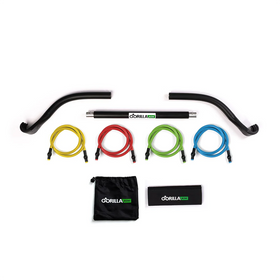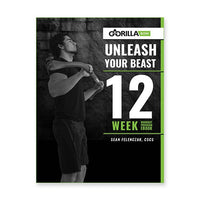Resistance Bands vs. Weights: Which One Is Better?

There’s only one topic that fitness fanatics debate more often than when to eat protein, and that’s whether or not free weights or resistance bands will give you a better workout.
While we like to think there’s a world where resistance bands and weights can coexist peacefully, one might reign supreme over the other. Let’s settle the score once and for all and figure out which one of these strength-building pieces of equipment is the most essential tool to have in your home gym.
Effectiveness
Perhaps one of the most important factors that will dictate whether or not to go with a resistance band over some dumbbells is how effective it is at toning or bulking your muscles. Each one has its own set of benefits.
Free weights remain a stagnant weight for the duration of the movement. In other words, when you do a bicep curl with a weight, it never becomes more or less difficult for the entire range of motion: the weight remains the same. This is really great if you want to build up muscle strength with challenging reps from start to finish.
Resistance bands, on the other hand, become progressively more difficult as the movement progresses. So with a bicep curl, the toughest part of the move occurs when your hands are closest to your shoulders, and it becomes easier as you lower them back to your sides. This is because there is less resistance acting on the band when it gets closer to the ground.
The uneven difficulty makes resistance bands great for muscle toning, as you’ll likely be able to complete more reps with lower weight as opposed to free weights.
- The verdict: Free weights and resistance bands are equally effective, just in different ways. Free weights tend to be more effective at bulking up muscles, whereas resistance bands are a bit better for toning and sculpting your muscles. With that said, each one will help you achieve your fitness goals.
Versatility
Doing the same workouts over and over again can become nauseating, and it can make you feel unmotivated. It’s important to be able to switch up your routine as much as possible so that it never gets old. So which one has more exercise options?
Free weights let you do a number of exercises with a full range of motion. Bent over rows, bicep curls, tricep extensions, and shoulder presses are just a few of the many types of exercises that can be elevated with a proper set of dumbbells.
However, resistance bands allow you to accomplish the same set of exercises, plus more. Free weights tend to focus more on the upper body only, whereas resistance bands give you the ability to get in a full-body workout. Plus, you can attach resistance bands to anchor points on the ceiling to do things like lat pulldowns, which are impossible with dumbbells.
- The verdict: Resistance bands are definitely more versatile than free weights. You can do pretty much every single exercise that you can with weights, in addition to a plethora of lower-body-focused moves.
Cost
If you’ve ever had a gym membership or gone to a fancy fitness studio, you already know how expensive it can be. But cost doesn’t have to be a barrier when you bring the gym right into your own home.
The issue is that free weights are very expensive. Since they’re made with high-quality metals, they often run a high price tag. But on top of that, shipping costs for such heavy weights are usually through the roof.
Free weights are also financially inconvenient, as the goal is to outgrow the weights you currently own. That means you’ll need to invest in a completely new set of weights to continue building muscle.
Resistance bands, on the other hand, are just long pieces of rubber. You can buy new bands at a much lower cost than free weights. You can even make existing resistance bands feel heavier by wrapping them around your hands and shortening their length. Resistance bands also typically come in multipacks that are lightweight, so you don’t need to worry about shipping surcharges.
- The verdict: Resistance bands are yet again a clear winner here, as you don’t need to spend tons of money to buy new weights as your muscles become stronger.
Convenience
Working out at home is just about as convenient as you can get. But sometimes, it’s fun to grow some gains in a new location.
Free weights aren’t really something that you can take with you if you decide to travel. While you might be able to take some dumbbells on a plane, be prepared to pay some hefty checked luggage fees. Not to mention, carrying weights to and from a different setting is much more of a hassle than it’s actually worth, and they can take up a lot of space in a bag.
Resistance bands, on the other hand, are lightweight and easily portable. They’re a perfect travel companion in your carry-on bag, and since you don’t need much space to use them, they’re great for getting in a workout in your hotel room.
You can also carry many more resistance bands with you than you can with dumbbells, so you can have more versatility no matter where you are.
- The verdict: Resistance bands take home another gold medal in this category, as they are much less clunky to carry around and are much easier to travel with. They’ll make sure that the grind never stops.
Accessibility
Not everyone was born knowing how to do tricep dips — everyone needs to start somewhere. So are free weights or resistance bands more suitable for those who are new to exercising?
Knowing how to use free weights can open the door for many more different exercises, but they can be hard to master. If you’re new to working out, using free weights can feel daunting if you haven’t been properly taught. Additionally, those with injuries or disabilities may have a difficult time using them.
On the other hand, resistance bands are easier to use and offer more of a selection for people who are new to strength training. These are great options for people who are just getting their feet wet in the world of fitness.
And for people who are recovering from injuries or who have disabilities, resistance bands tend to be a more accessible alternative to free weights that will accomplish the exact same goals.
- The verdict: While resistance bands may not offer what complex bodybuilding routines need, bands are much more accessible, especially for people who are disabled, injured, or brand new to strength training.
The Best of Both Worlds
Free weights and resistance bands each have their benefits and their disadvantages. And just when you thought there’d be no way to combine the best parts of both into one, we came up with the Gorilla Bow.
The Gorilla Bow takes the versatility, convenience, and ease of use of resistance bands and pairs it with the muscle-building, balanced properties of free weights. It means that you’ll be able to get in a killer strength-building workout anytime, anywhere.
The bow acts as a bar, giving you the same grip as dumbbells and lets you perform exercises like seated rows, incline presses, and other exercises that are impossible with bands alone. However, the band portion lets you complete exercises like lat pulldowns, which are impossible with free weights alone.
Basically, the Gorilla Bow is everything you’ve ever wanted in one package.
Join the Resistance
While free weights and resistance bands each have their pros and cons, there is a pretty clear winner as far as which one will be more beneficial for your at-home workout sessions.
Resistance bands outperform free weights because they are extremely easy to use, are lightweight and versatile, are much more cost-effective, and can easily be tailored to fit your desired regimen. You’ll be able to bulk up, tone up, and level up without taking up too much space or spending tons of money on replacement dumbbells.
With that said, having resistance bands doesn't mean much if you don’t know how to use them. The Gorilla Bow All-Access Membership has live and on-demand classes that will teach you everything you need to know about your resistance trainer. It’s like attending studio fitness classes from the comfort of your own home.
Sources:
How to Build Strength - A Year of Living Better Guides | The New York Times
Fitness: Tips for staying motivated | The Mayo Clinic
Resistance Training for Persons with Physical Disabilities | NCHPAD










Leave a comment